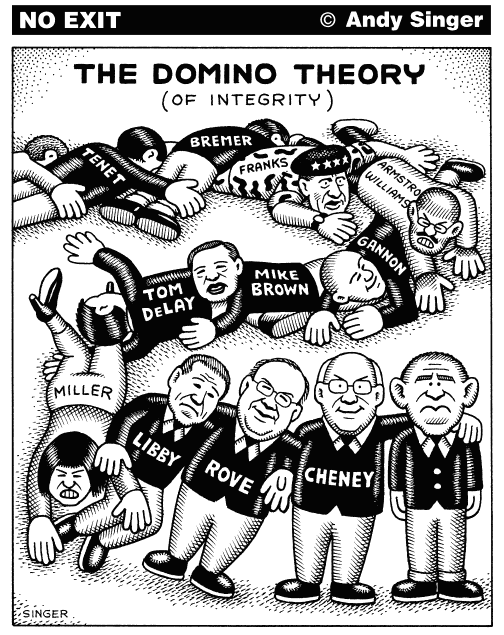Search
Recent comments
- sicko....
2 hours 12 min ago - brink...
2 hours 28 min ago - gigafactory.....
4 hours 15 min ago - military heat....
4 hours 57 min ago - arseholic....
9 hours 41 min ago - cruelty....
10 hours 57 min ago - japan's gas....
11 hours 38 min ago - peacemonger....
12 hours 35 min ago - see also:
21 hours 36 min ago - calculus....
21 hours 50 min ago
Democracy Links
Member's Off-site Blogs
all fall down .....

It’s been obvious almost from the beginning of the first Bush Administration that neither Bush nor his kitchen cabinet had much interest in or knowledge of the world outside the USA.
They blundered from one embarrassment to another, screwing up or forgetting funny foreign names, confusing Sunnis and Shiites (that’s after the penny finally dropped that the Middle East wasn’t populated by homogeneous Muslim terrorists), expressing child-like amazement at the size of Brazil on a map and so on.
One hoped that this ignorance reflected an innocent naivete; that these rather ordinary members of the American ruling class had stumbled into power in a time of perceived calm and prosperity and were simply unprepared to deal with the complex issues of foreign policy that were suddenly thrust upon them.
One hoped, fervently, that the people concerned would have immediately embarked upon a crash course of education so they could develop more informed attitudes and policies over time.
One’s hopes were, unfortunately, in vain.- By John Richardson at 21 Apr 2008 - 11:43pm
- John Richardson's blog
- Login or register to post comments
the oldie in fluffy slippers...
Taliban fighters brandished Kalashnikovs and shook their fists in the air after the Sept. 11 terrorist attacks, defying American warnings that if they did not hand over Osama Bin Laden, their country would be bombed to smithereens.
The bravado faded once American bombs began to fall. Within a few weeks, many of the Taliban had fled the Afghan capital, terrified by the low whine of approaching B-52 aircraft. Soon, they were a spent force, on the run across the arid mountain-scape of Afghanistan. As one of the journalists who covered them in the early days of the war, I saw their uncertainty and loss of control firsthand.
It was in the waning days of November 2001 that Taliban leaders began to reach out to Hamid Karzai, who would soon become the interim president of Afghanistan: They wanted to make a deal.
“The Taliban were completely defeated, they had no demands, except amnesty,” recalled Barnett Rubin, who worked with the United Nations’ political team in Afghanistan at the time.
Messengers shuttled back and forth between Mr. Karzai and the headquarters of the Taliban leader, Mullah Muhammad Omar, in Kandahar. Mr. Karzai envisioned a Taliban surrender that would keep the militants from playing any significant role in the country’s future.
But Washington, confident that the Taliban would be wiped out forever, was in no mood for a deal.
“The United States is not inclined to negotiate surrenders,”Secretary of Defense Donald H. Rumsfeld said in a news conference at the time, adding that the Americans had no interest in leaving Mullah Omar to live out his days anywhere in Afghanistan. The United States wanted him captured or dead.
Almost 20 years later, the United States did negotiate a deal to end the Afghan war, but the balance of power was entirely different by then — it favored the Taliban.
For diplomats who had spent years trying to shore up the U.S. and NATO mission in Afghanistan, the deal that President Donald J. Trump struck with the Taliban in February 2020 to withdraw American troops — an agreement President Biden decided to uphold shortly after taking office this year — felt like a betrayal.
Now, with the Taliban back in power, some of those diplomats are looking back at a missed chance by the United States, all those years ago, to pursue a Taliban surrender that could have halted America’s longest war in its infancy, or shortened it considerably, sparing many lives.
For some veterans of America’s entanglement in Afghanistan, it is hard to imagine that talks with the Taliban in 2001 would have yielded a worse outcome than what the United States ultimately got.
“One mistake was that we turned down the Taliban’s attempt to negotiate,” Carter Malkasian, a former senior adviser to Gen. Joseph Dunford, who was chairman of the Joint Chiefs of Staff during parts of the Obama and Trump administrations, said of the American decision not to discuss a Taliban surrender nearly 20 years ago.
“We were hugely overconfident in 2001, and we thought the Taliban had gone away and weren’t going to come back,” he said. “We also wanted revenge, and so we made a lot of mistakes that we shouldn’t have made.”
Read more:
https://www.nytimes.com/2021/08/23/world/middleeast/afghanistan-taliban-deal-united-states.html
We knew this. Read from top. But the Bush administration (and the Clinton's) was way beyond ignorance — and full of arrogance. The US were full of their own hubris. We knew the US had been on regime oil change and radiator coolant since Ike had warned us about the US military machine. You can't keep such a big engine on idle for too long. It's like a dog. You don't give it a stick to chase, it will bite your hand or grow fatter, making bigger turds on your carpet... When Trump started to "bring the troops home", the generals, the media and the public bit his hands. But the Afghanistan motion was in place. Biden-the-moralist chose to follow. In his inimitable ways, Biden who tends to muck up nearly everything, including Amerika with the "Patriot Act", had no idea on how to organise a decent retreat, except keep his blue suit impeccable. Insouciance comes to mind, unless it's old age when "hurry" and decisive action means shuffle and walking stick for the oldie in fluffy slippers on the way to the seized-up creaking rocking chair. I know...